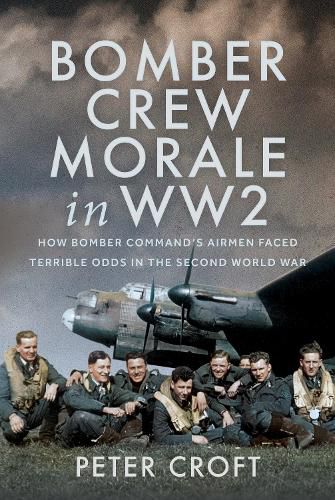Readings Newsletter
Become a Readings Member to make your shopping experience even easier.
Sign in or sign up for free!
You’re not far away from qualifying for FREE standard shipping within Australia
You’ve qualified for FREE standard shipping within Australia
The cart is loading…






During the Second World War, 125,000 aircrew served in RAF Bomber Command, of whom a staggering 55,573 were killed - about 44% of those who joined its ranks. Despite these odds, aircrews climbed into their aircraft night after night, facing near-certain death. How did they maintain morale in the face of such peril? RAF High Command recognized the importance of morale but struggled to define it. Their efforts focused on discipline, providing reliable equipment, and strong leadership. However, the intrinsic qualities of the aircrews were also vital. The crews, composed of young, patriotic men, showed stoicism, resolve, and camaraderie. The individual actions of each crew member became critical to their survival, and they relied on one another, knowing that failure could mean death. Besides combat risks like flak and night fighters, airmen faced numerous dangers such as mechanical failure, lack of oxygen, fatigue, and accidents during take-off and landing. Even without enemy threats, flying was inherently risky. This work honours the bravery of Bomber Command's men - those who survived and those whose lives were cut short - and reflects on their extraordinary courage in the face of seemingly insurmountable odds. AUTHOR: Peter Croft was born in Edinburgh in 1947 and grew up in Felixstowe, Suffolk. After leaving Felixstowe Grammar School he became a Clerical Officer in the Ministry of Pensions and National Insurance. On leaving the Civil Service he had a spell driving buses for Ipswich Borough Transport. He then took a course in American Studies at the University of Manchester in 1978 and gained a B.A. (Hons) Degree. He took up the Teaching of English as a Foreign Language, firstly in Cambridge, then working in Italy, Czechoslovakia and Hungary. He took a break from teaching in 1999 to begin research on morale in R.A.F. Bomber Command for an M.Sc. in Second World War Studies at the University of Edinburgh. In 2000, after gaining his degree, he resumed teaching, taking up posts in Qatar, Libya, Angola and Iraq. In 2013 he retired to the city of his birth, where he still lives. 20 b/w illustrations
$9.00 standard shipping within Australia
FREE standard shipping within Australia for orders over $100.00
Express & International shipping calculated at checkout
During the Second World War, 125,000 aircrew served in RAF Bomber Command, of whom a staggering 55,573 were killed - about 44% of those who joined its ranks. Despite these odds, aircrews climbed into their aircraft night after night, facing near-certain death. How did they maintain morale in the face of such peril? RAF High Command recognized the importance of morale but struggled to define it. Their efforts focused on discipline, providing reliable equipment, and strong leadership. However, the intrinsic qualities of the aircrews were also vital. The crews, composed of young, patriotic men, showed stoicism, resolve, and camaraderie. The individual actions of each crew member became critical to their survival, and they relied on one another, knowing that failure could mean death. Besides combat risks like flak and night fighters, airmen faced numerous dangers such as mechanical failure, lack of oxygen, fatigue, and accidents during take-off and landing. Even without enemy threats, flying was inherently risky. This work honours the bravery of Bomber Command's men - those who survived and those whose lives were cut short - and reflects on their extraordinary courage in the face of seemingly insurmountable odds. AUTHOR: Peter Croft was born in Edinburgh in 1947 and grew up in Felixstowe, Suffolk. After leaving Felixstowe Grammar School he became a Clerical Officer in the Ministry of Pensions and National Insurance. On leaving the Civil Service he had a spell driving buses for Ipswich Borough Transport. He then took a course in American Studies at the University of Manchester in 1978 and gained a B.A. (Hons) Degree. He took up the Teaching of English as a Foreign Language, firstly in Cambridge, then working in Italy, Czechoslovakia and Hungary. He took a break from teaching in 1999 to begin research on morale in R.A.F. Bomber Command for an M.Sc. in Second World War Studies at the University of Edinburgh. In 2000, after gaining his degree, he resumed teaching, taking up posts in Qatar, Libya, Angola and Iraq. In 2013 he retired to the city of his birth, where he still lives. 20 b/w illustrations